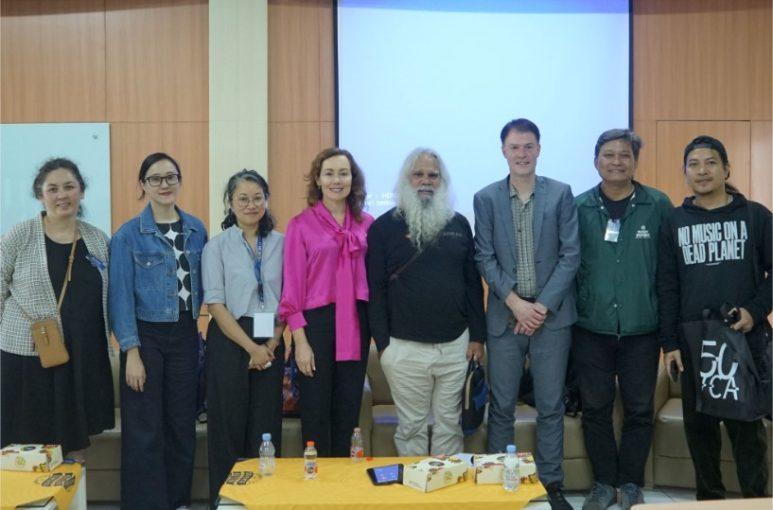
Yogyakarta, July 6th 2023─Socio-cultural and artistic activism in voicing minority issues to environmental protection continues to increase efforts through collaboration between sectors and the use of various platforms. Highlighting this issue, the fifth panel of the series of activities Australia-Indonesia in Conversation: Valuing Democracy and Diversity: Equity, Leadership and Social Justice discussed the issue of “Socio-cultural Activism and Arts for Change” on Thursday (06/7) in the BE 210 room FISIPOL and on Zoom Meeting.
Climate change, which is a national and even global issue, is an important highlight as an agenda that must be activated to maintain the continuity of nature and humans. At the event, Ewa Wojkowska as the Founder and COO of Kopernik presented the contribution that Kopernik had made in campaigning for environmental issues, especially plastic waste. Kopernik partnered with Navicula, and collaborated with Erick EST to create a song to promote the social and environmental activist movement through a song titled “Terus Berjuang” in 2016. Not only that, Kopernik is also working on a documentary, namely “Plastic Island” which has been broadcast on Netflix.
“The biggest collaboration to date is a documentary project entitled “Plastic Island” to increase public awareness regarding the use of single-use plastics and advocacy for policy changes,” explained Ewa.
Collaboration between environmental activists and researchers and musicians at Kopernik is also reflected in the IKLIM program, one of which is carried out by I Gede Robi Supriyanto, a musician and activist as well as the founder of Akagrass.com. Robi said that it was hoped that collaboration and the use of various media would reach more influential people, the government, and media journalists to raise more important issues, especially issues of ecology and climate change, which could become priority issues to be worked on and paid attention to by the upcoming elections.
Meanwhile, Natalie King, Professor of Visual Arts from the University of Melbourne also highlighted how the visual arts also contribute to the introduction of history to give voice to marginalized people. One of them is through the project “Paradise Camp by Yuki Kihara”, which represents minority groups, namely Fa’afine in Samoa and is shown through the 2022 Venice Biennale exhibition. According to Natalie, creative artists have an important role related to their imagination in conveying important issues, especially in representing the voices of minority groups or those who have been marginalized in the past or in the future.
From discussions brought by experts and environmental activists to this history, it can be found that issues of change in both the environment, human rights and minority rights continue to be pursued and developed through a variety of creative steps. Both utilize social media and promotional activities such as art exhibitions, cultural heritage exhibitions, music, festivals, and films.
